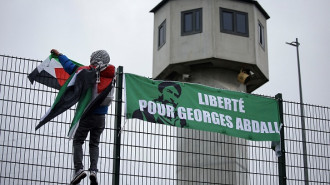Egypt state broadcasting employee killed by masked gunmen in Sinai
Medical sources from the Arish general hospital told The New Arab the victim had been identified as 57-year-old Maher Mohammed Shaaban who worked at the Egyptian Radio and Television Union broadcaster and lived in the Masaid neighbourhood of Arish.
The sources added Shaaban was pronounced dead on arrival at the hospital after being shot at extremely close range.
Attacks on Monday and Tuesday came after weeks of relative quiet in the Arish area, which for years has been plagued by deadly militant attacks by the Wilayat Sinai extremist group who pledged allegiance to IS.
Several Egyptian soldiers were killed on Monday in twin attacks targeting the army in Rafah and Sheikh Zuweid, two of the main towns in the northern Sinai.
Tribal sources told The New Arab an IED blast targeted a group of soldiers in the Abu Rashoud area south of Sheikh Zuweid during a military operation, killing one soldier and wounding several others.
Read more: In Sisi's Egypt, collective punishment is tearing entire families apart
The sources added army forces sent reinforcements to the targeted area, transporting the injured troops to the Arish military hospital.
The same day, militants launched a multi-pronged ambush on a checkpoint in Rafah, sparking violent clashes between soldiers and militants, which resulted in several fatalities and injuries.
Eyewitnesses informed The New Arab the militants were believed to belong to Wilayat Sinai.
On 9 February this year, the Egyptian military launched a land, air and sea assault across the northern Sinai, as part of a large-scale operation to rid the region of Wilayat Sinai extremists.
As part of the the offensive, thousands of homes have been demolished and hundreds of civilians have been wounded and some killed, while some 5,000 residents of the region have been arrested without charge. Many schools, universities and workplaces have been shut down, which on top of power and mobile network outages, has sparked economic trouble for Sinai residents.
Rights groups have warned of an impending humanitarian crisis in the region, compounded by food, water and fuel shortages after the blockade restricted imports to the area.







 Follow the Middle East's top stories in English at The New Arab on Google News
Follow the Middle East's top stories in English at The New Arab on Google News


![Aid Gaza [Getty]](/sites/default/files/styles/image_330x185/public/2010004231.jpeg?h=cb957c44&itok=NpHeiZFt)